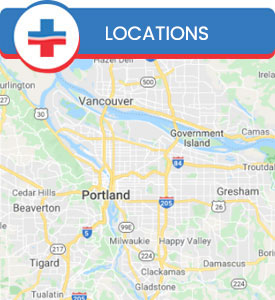Parasites: Types, Symptoms, Treatment & Prevention
Parasites are organisms that cause parasitic infections, often causing intestinal illnesses like diarrhea and vomiting. They can also cause fever, weakness, fatigue, pain, itchy skin rashes, or infect other parts of the body. Columbia Clinic Urgent Care offers treatment for most parasitic infections. If you have symptoms, consult a healthcare provider to discuss treatment options and address any concerns. For more information, contact us or book an appointment online. We have convenient locations to serve you at Tibbetts St Portland, Stark Street Portland and Tigard, OR.


Table of Contents:
What are the types of parasites?
What are the symptoms of a parasite infection?
What are silent signs you could have a parasite?
How do you treat parasite infections?
How can I prevent parasitic infections?
Parasitic diseases in humans occur due to a variety of parasites, which are organisms living in or on other organisms, known as hosts, that cause harm to them. There are three major classes of parasites that cause illnesses in humans: protozoa, helminths, and ectoparasites.
Protozoa are single-celled organisms like amoebas that can affect the gut and other body parts.
Helminths are worm-like parasites, including pinworms, roundworms, and tapeworms.
Ectoparasites, such as lice and mites, live on the host’s external surface and can attach to or burrow into the skin, remaining there for extended periods.
People often acquire these parasites through contaminated food or water, primarily by ingesting these substances, or through bites.
Symptoms of a parasite infection can range from gastrointestinal discomfort to more systemic issues. Common symptoms include digestive problems such as diarrhea, constipation, gas, and nausea.
Additionally, skin problems like eczema, hives, or itching may be observed, along with other symptoms like fatigue, and nutrient deficiencies, particularly anemia. These symptoms are caused by parasites that induce inflammation, and immune suppression, and sometimes trigger autoimmune responses.
Gastrointestinal symptoms can range from abdominal pain to cramping and bloating. In severe cases, weight loss can occur despite a normal or increased appetite, as the parasites consume nutrients, leaving the host malnourished.
Parasitic infections may go unnoticed for years, as they often do not exhibit obvious signs. And oftentimes, some of the symptoms may be mistaken for other conditions or more acute illnesses.
Silent signs can include digestive disorders such as gas, diarrhea, or constipation, which may not be immediately distressing.
Skin conditions like eczema, hives, or chronic itching without a known cause can also indicate parasitic infection. Diminished energy levels or constant tiredness and weakness can be a subtle sign of parasitic infection.
Grinding teeth during sleep might also be an unnoticed indicator. Nutritional deficiencies, particularly anemia, are another silent sign of parasitic infections.
Fever, muscle pain, and vomiting are symptoms often associated with common diseases but could also indicate the presence of parasites. Gastrointestinal issues leading to unexplained weight loss are another potential sign of a parasite infestation whose cause may not be immediately clear.
There are a range of treatment options available for parasitic infections, and which one is right for each patient will be dictated by several factors. Treatment for parasitic infections typically requires antiparasitic medication, with the specific treatment depending on the type of parasite involved.
For bacterial or fungal parasitic infections, antibiotics or antifungal medications may be used. Oral medications are commonly administered, while topical treatments such as creams and ointments are applied in cases involving the skin.
Some people prefer natural methods, such as dietary cleanses believed to help flush out parasites. However, accurate diagnosis is necessary, as different parasites require different treatments. In conventional medicine, antiparasitic drugs like praziquantel and mebendazole are commonly used.
Preventing parasitic infections involves several lifestyle changes and precautions. Maintaining good hygiene through regular hand washing and consuming clean food and water is crucial. Avoiding unsanitary places, protecting oneself from bug bites, and practicing safe sex are important to prevent infection.
Dietary changes can also assist in preventing parasitic infections. Avoiding oily, spicy, and fried foods and opting for immune-boosting foods. Wearing gloves in potentially contaminated environments is important.
Drinking only sealed bottled water, avoiding ice in drinks, and eating thoroughly cooked food are essential precautions, especially while traveling to areas with a higher risk of contamination.
Malaria prevention involves taking medication before, during, and after traveling to infected areas. Consulting a doctor about malaria prevention before such trips is essential.
Practicing good hygiene and being cautious around potentially contaminated food and water can significantly reduce the risk of parasitic infections.
If you have parasite symptoms, visit us at Columbia Clinic Urgent Care for diagnosis and treatment. For more information, please contact us or book an appointment online. We serve patients from Tibbetts St Portland, Milwaukie OR, Oak Grove OR, Stark Street Portland, Fairview OR, Happy Valley OR, Gladstone OR, Cedar Mill OR, Tigard OR, Lake Oswego OR, Tualatin OR, Oregon City OR.


